Introduction: Writing Skills | English Grammar Advanced - Class 10 PDF Download
| Table of contents |

|
| Introduction |

|
| Letters |

|
| Informal Letters |

|
| Tips and Tricks for Writing |

|

Introduction
- Writing on a particular topic assists students in articulating their thoughts, demonstrating creativity, and conveying ideas in a clear and comprehensible manner.
- To improve writing skills, students should participate in various activities from an early age, including composing articles, messages, and letters. Regular practice is crucial for development.
- Writing a page or two daily—whether about personal experiences or new information—can significantly contribute to refining writing capabilities.
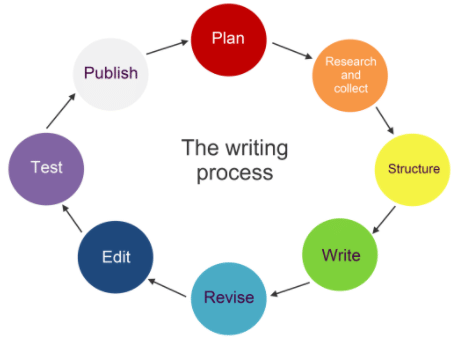
Objectives of Writing
- Evaluate students' proficiency in using verbal input for coherent writing and assess their grammatical accuracy.
- Assess students' ability to present ideas concisely and coherently.
- Evaluate their skill in writing clear descriptions focused on the main topic.
- Assist in developing ideas around a given topic, including a structured introduction and conclusion.
- Ensure appropriate style and format in elaborating ideas.
- Evaluate argumentative and analytical capabilities.
Evaluation Criteria
- Emphasis on clarity, fluency, and grammatical correctness of expressed ideas.
- Coherence in planning, organizing, and presenting ideas with proper introductions, developments, and summaries.
- Skills in comparing and contrasting ideas and drawing conclusions.
- Ability to present arguments with supporting examples using suitable styles and formats.
- Capacity to expand notes into comprehensive writings expressed creatively in appropriate styles and language.
- Use of vocabulary, grammar, punctuation, and spelling.
Ways to Practice Writing
- Regular writing to improve skills.
- Engaging in various writing formats to gain diverse experience.
- Seeking feedback to enhance writing quality.
Letters
Letters are an important means of communication between individuals and organizations. While methods like SMS, social messaging apps, and emails have become popular and often replace letters, they still hold significance. Letters foster strong relationships and can be kept as mementos or records.There are two types of letter :
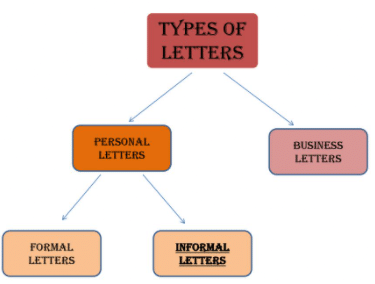 1. Formal Letter
1. Formal Letter
2. Informal Letter
Formal Letters
Formal letters are generally written to a higher authority like an official, or to the editor of a newspaper or magazine. The language and format are of utmost importance in writing formal letters. For students, letter writing has long term purposes. The students learn how to formally write a letter, and in what language and format should he/she present his/ her ideas/views. Here’s what to include:
- From: This section should include the name provided in the question. If no name is given, students can use 'ABC' or 'XYZ.' It should also include the date and address, which can be fictitious or as specified.
- To: This should be directed to a higher authority or official. For instance, if a student is writing to a teacher or principal, a specific format must be followed, varying based on the letter's purpose, such as a complaint or inquiry.
- Subject: This line should clearly indicate the letter’s main purpose, such as 'Request for,' 'Complaint about,' or 'Order for.'
- Salutation: This is how the recipient is addressed, for example, 'Respected Sir,' 'Dear Sir,' or 'Madam.'
- The Body: This is the main content of the letter, which may consist of two or three paragraphs. The opening should briefly state the letter's purpose, using phrases like 'I write this letter to...' or 'This is to bring to your notice...'. The second paragraph should elaborate on the main topic, and if it’s an order, a list of items with their quantities should be included. The concluding paragraph should prompt action from the recipient, such as 'I hope...' or 'I request you...'.
- Subscription: This is how the letter is signed off. In formal letters, use phrases like 'Yours truly,' 'Yours sincerely,' or 'Yours obediently,' followed by the writer's signature. In some cases, it’s also appropriate to add 'Thanking you' before the signature.
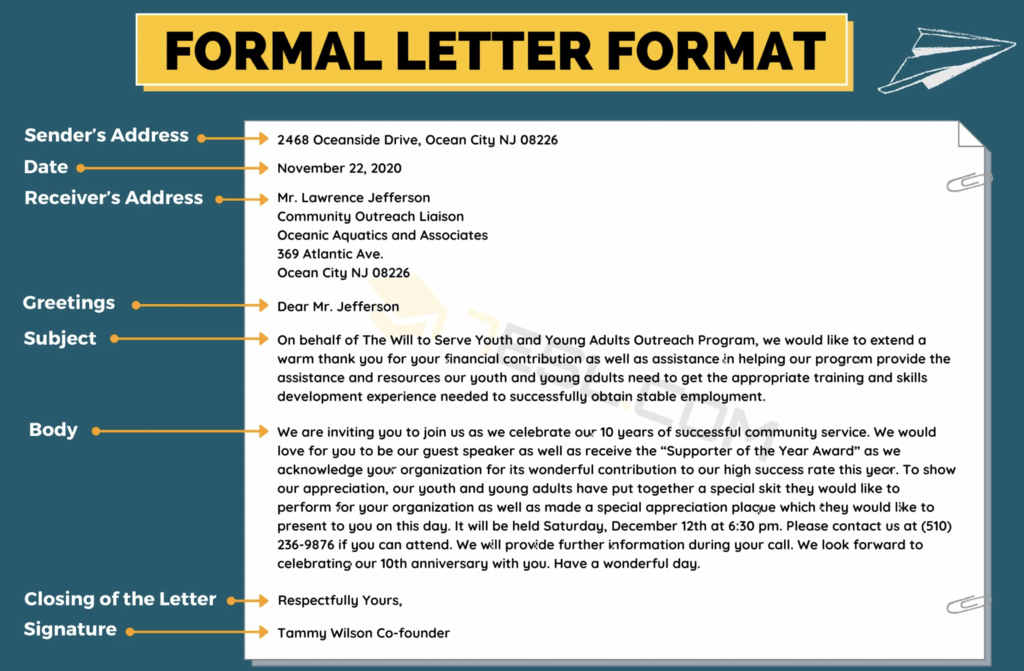
Informal Letters
These letters are written to someone close to you. It may be your kith and kin or a friend to whom you like to share your joy/sorrow about an event that happened to you or to the person to whom the letter is addressed. The language in these letters is informal and in fact conversational.
- Address: Start the letter with your address, then write the date. You can leave out the subject line, but include it if it helps explain what the letter is about.
- Salutation: Always begin with "Dear..." followed by the person's name.
- The Body: Begin by asking how the person is doing, like saying "How are you?" or "I hope you're well." After that, get to the main point, whether you're congratulating them or offering condolences. Adding a personal touch at the end, like "Please send my regards to..." makes the letter feel warmer.
- Subscription: Close the letter with phrases like "yours lovingly," "Your loving son," or "Your dearest friend," and then write your name.
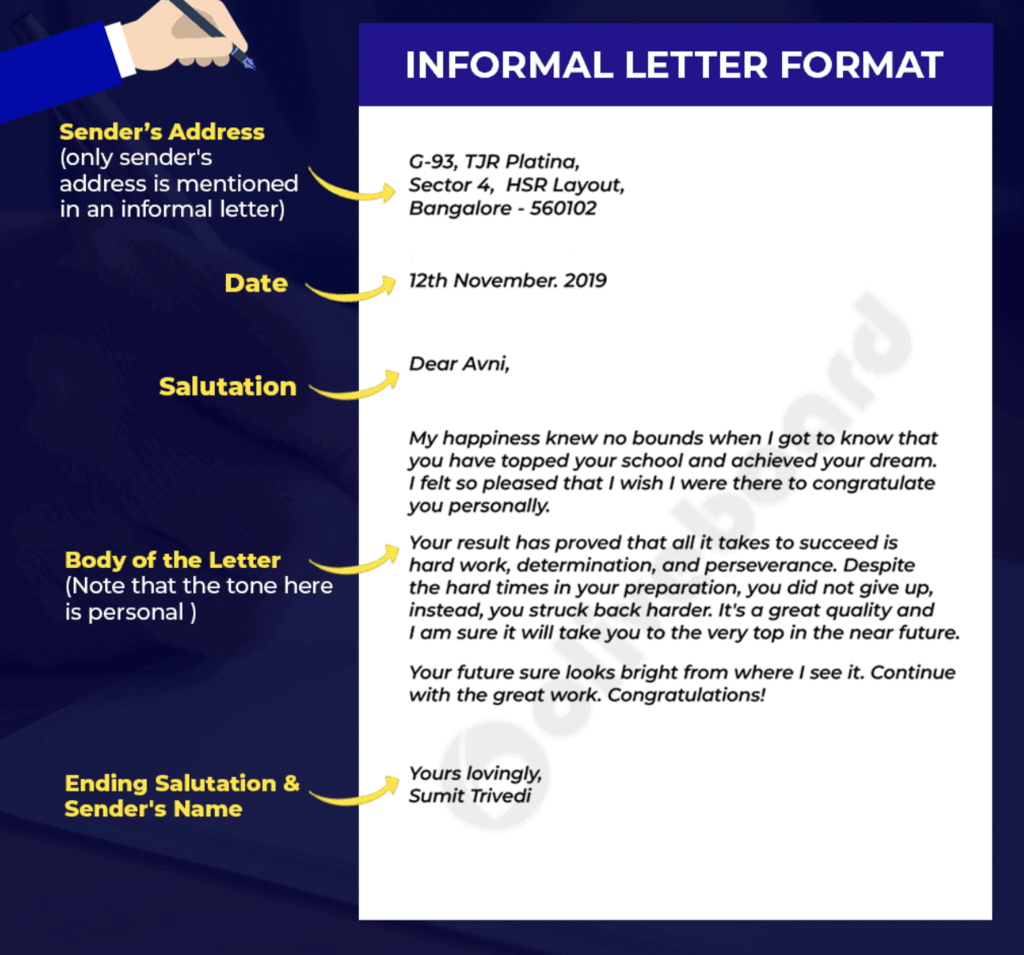
Diary
A diary is simply a record of the daily events in your life. Instead of writing in a dull way, diary entries can be made more interesting by adding a good style, a bit of humour, and personal opinions when needed. Unlike other types of writing, a diary does not need a specific topic; it just requires you to express your thoughts and feelings about what happened that day.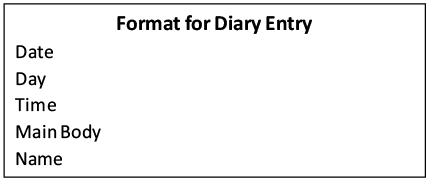
Steps to follow :
- Begin the entry with a general introduction, describing the day or momentary feelings.
- In the body, you may discuss an event of the day that inspired or influenced you.
- Conclude with a final remark.
Article Writing
Writing an article can be challenging as it demands creativity , a strong vocabulary, subject knowledge, and the ability to organize thoughts. An article is a type of non-fiction writing focused on a particular topic. Besides presentation skills, students need basic knowledge about the subject they are writing on. They might also need to incorporate facts along with their personal opinions. Unlike diary entries, article writing is generally objective , relying more on information gathered from various sources rather than individual experiences. 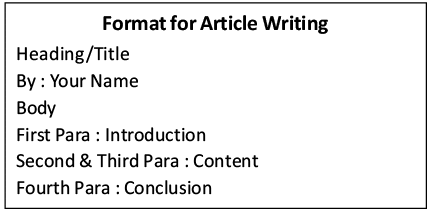
Debate
A debate is a formal discussion or argument about a specific topic where participants hold differing views. The primary objective of a debate is to evaluate the skills and ability to present an argument effectively. When writing a debate, one must take either a supportive or opposing stance on the issue at hand, meaning you are either for or against the topic mentioned in the question. It's crucial to maintain a strong position to back up your views effectively.
Importance of Critical Thinking
- Debates require students to think critically and understand how to present arguments from both sides. For example, if asked to debate whether "computers are a boon or a bane," a student should be able to argue that computers are a "boon" while also understanding their potential drawbacks.
- Knowing both sides of the argument allows for a more assertive and convincing debate.
Engaging the Audience
- When presenting a debate, it's essential to imagine addressing an audience. Starting with phrases like "I am here to put forth..." or "I am here to argue that..." helps engage the listeners.
- Incorporating opposing views in the main part of the debate strengthens the argument and demonstrates a well-rounded understanding of the topic.

Speech
A speech is typically crafted to share ideas with the public. When writing a speech, it's important to start in a way that reflects how it will be delivered. Addressing the audience is crucial; for a student's speech, beginning with "Respected..." is suitable. Since most speeches are formal, choosing words carefully when addressing the audience is essential.
After the greeting, the purpose of the speech should be introduced with phrases like "I am here to speak..." or "Let me first introduce...". The main content should express thoughts clearly in straightforward language, focusing on the central topic.
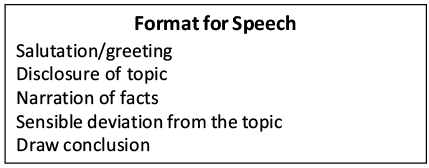
Short Story
Writing a short story requires a strong imagination. It becomes easier if you have clues like hints, a starting point, or a specific topic. Without these, it can be challenging to come up with a creative idea. For some, storytelling is a natural talent, while others find inspiration from their surroundings or by reading various stories.
To make a short story engaging, you might start in the middle of an action with lines like "I never expected that...", "Finally, I got the...", or "The news was a shock...". Other narrative styles could include beginnings like "The other day, I happened to see..." or "That man whom I used to find near the bus stand...". For students writing a story with a provided beginning or ending, the best approach is to jot down hints such as characters and situations before weaving them into a complete narrative.
Hint-expansion can simplify story writing since the hints outline the plot, allowing students to create connecting sentences. Observing events around you and using them as inspiration can help improve storytelling skills, which develop with practice.
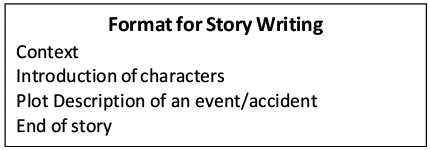
Tips and Tricks for Writing

- Start with an engaging introduction—this could include a catchy title or an interesting quote if it's an article, or an introduction for a debate or speech.
- Brush up on your grammar skills and keep new words handy for use when possible.
- Use clear and simple language, ensuring that your sentences are grammatically correct.
- Keep sentences short and precise to effectively convey your ideas. Long sentences can be confusing and may lose the reader's interest.
- Use figurative language sparingly to enhance the richness of your writing.
- Stay focused on the topic you are writing about.
- If possible, jot down your points as hints first, which you can refine before writing your main piece.
- Ending with a cliffhanger can make your writing more impactful, perhaps by posing a thought-provoking question or leaving the reader contemplating your topic.
- Finally, practice daily to develop strong writing skills naturally.
|
53 videos|210 docs|40 tests
|
FAQs on Introduction: Writing Skills - English Grammar Advanced - Class 10
| 1. What are the key components of an informal letter? |  |
| 2. How do I start an informal letter? |  |
| 3. What is the difference between formal and informal letters? |  |
| 4. Can I use slang in an informal letter? |  |
| 5. What are some tips for writing a good informal letter? |  |





















